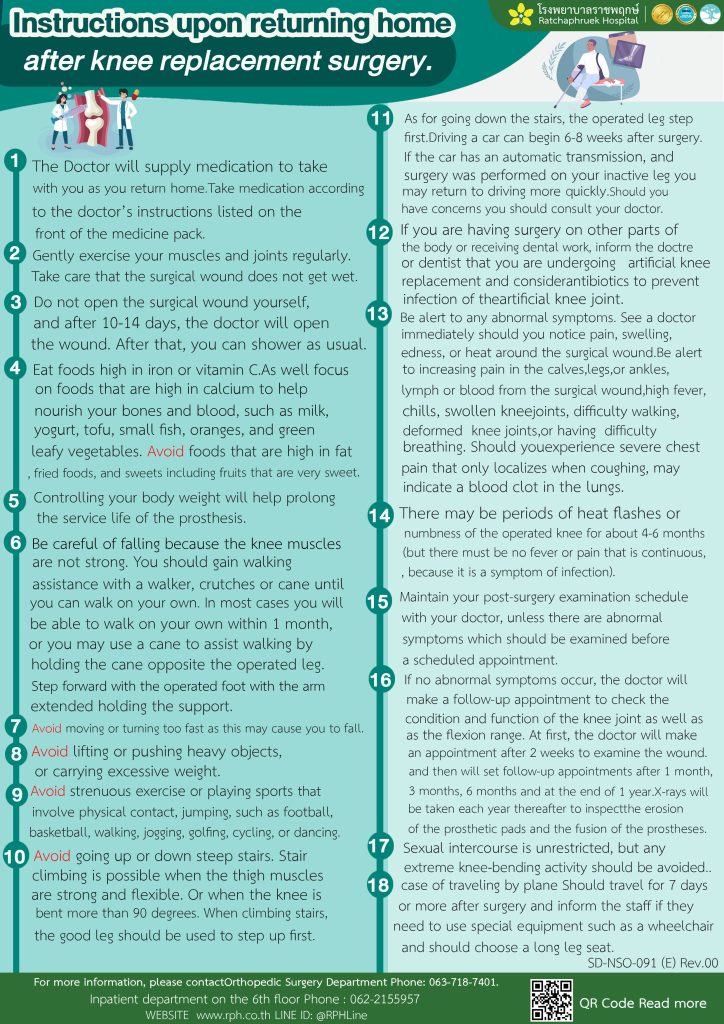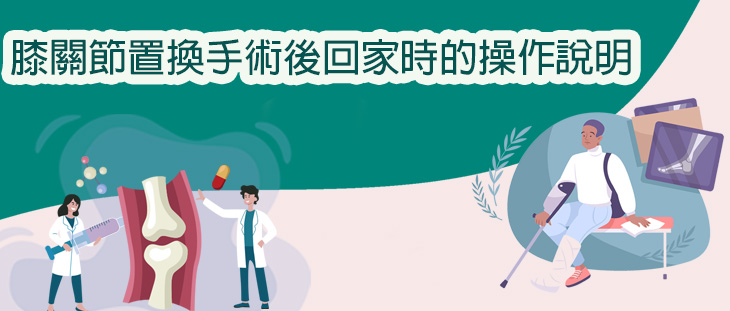- The Doctor will supply medication to take with you as you return home. Take medication according to the doctor’s instructions listed on the front of the medicine pack.
- Gently exercise your muscles and joints regularly.
- Take care that the surgical wound does not get wet. Do not open the surgical wound yourself, and after 10-14 days, the doctor will open the wound. After that, you can shower as usual.
- Eat foods high in iron or vitamin C. As well focus on foods that are high in calcium to help nourish your bones and blood, such as milk, yogurt, tofu, small fish, oranges, and green leafy vegetables. Avoid foods that are high in fat, fried foods, and sweets including fruits that are very sweet.
- Controlling your body weight will help prolong the service life of the prosthesis.
- Be careful of falling because the knee muscles are not strong. You should gain walking assistance with a walker, crutches or cane until you can walk on your own. In most cases you will be able to walk on your own within 1 month, or you may use a cane to assist walking by holding the cane opposite the operated leg. Step forward with the operated foot with the arm extended holding the support.
- Avoid moving or turning too fast as this may cause you to fall.
- Avoid lifting or pushing heavy objects, or carrying excessive weight.
- Avoid strenuous exercise or playing sports that involve physical contact, jumping, such as football, basketball, walking, jogging, golfing, cycling, or dancing.
- Avoid going up or down steep stairs. Stair climbing is possible when the thigh muscles are strong and flexible. Or when the knee is bent more than 90 degrees. When climbing stairs, the good leg should be used to step up first. As for going down the stairs, the operated leg step first.
- Driving a car can begin 6-8 weeks after surgery. If the car has an automatic transmission, and surgery was performed on your inactive leg you may return to driving more quickly. Should you have concerns you should consult your doctor.
- If you are having surgery on other parts of the body or receiving dental work, inform the doctor or dentist that you are undergoing artificial knee replacement and consider antibiotics to prevent infection of the artificial knee joint.
- Be alert to any abnormal symptoms. See a doctor immediately should you notice pain, swelling, redness, or heat around the surgical wound. Be alert to increasing pain in the calves, legs, or ankles, lymph or blood from the surgical wound, high fever, chills, swollen knee joints, difficulty walking, deformed knee joints, or having difficulty breathing. Should you experience severe chest pain that only localizes when coughing, may indicate a blood clot in the lungs.
- There may be periods of heat flashes or numbness of the operated knee for about 4-6 months (but there must be no fever or pain that is continuous, because it is a symptom of infection).
- Maintain your post-surgery examination schedule with your doctor, unless there are abnormal symptoms which should be examined before a scheduled appointment.
- If no abnormal symptoms occur, the doctor will make a follow-up appointment to check the condition and function of the knee joint as well as the flexion range. At first, the doctor will make an appointment after 2 weeks to examine the wound. and then will set follow-up appointments after 1 month, 3 months, 6 months and at the end of 1 year. X-rays will be taken each year thereafter to inspect the erosion of the prosthetic pads and the fusion of the prostheses.
- Sexual intercourse is unrestricted, but any extreme knee-bending activity should be avoided.
- .case of traveling by plane Should travel for 7 days or more after surgery and inform the staff if they need to use special equipment such as a wheelchair and should choose a long leg seat.

For more information, please contact
Orthopedic Surgery Department Phone: 063-718-7401.
Inpatient department on the 6th floor Phone : 062-2155957
WEBSITE www.rph.co.th
LINE ID: @RPHLine
 English
English 
 Hotline 043-333555
Hotline 043-333555

